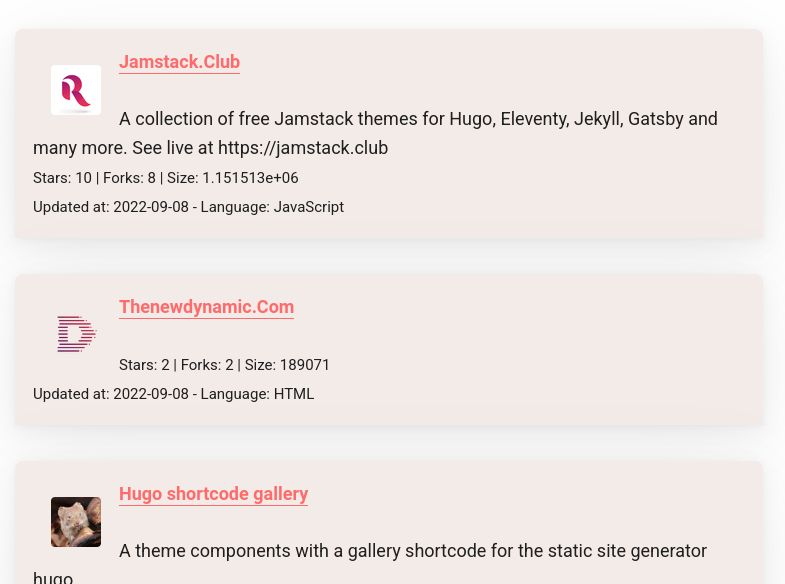Preview
In this example, we fetch the last 3 starred repos on Github. For each repo, we display the amount of stars and forks, the size of the repo and the last update:
See the demo on roneo.app for live examples.
Usage
Get the last 3 starred repositories:
{{< github-api url="https://api.github.com/users/RoneoOrg/starred?per_page=3" >}}
Get the last 5 updated repositories:
{{< github-api url="https://api.github.com/users/RoneoOrg/repos?type=owner&sort=updated&per_page=5" >}}
(Customize the amount of data with ?per_page=5)
Installation
Recommended: install as a Theme Component and get the last version.
OR paste the following code in layouts/shortcodes/github-api.html:
<ul class="github-api">
{{ $url := .Get "url" }}
{{ range getJSON $url }}
{{ $p := . }}
<li>
<div class="github-avatar">
<img src="{{$p.owner.avatar_url}}" alt="Avatar of {{$p.owner.login}}" title="Avatar of {{$p.owner.login}}">
</div>
<div class="github-name">
<strong>
<a href="{{ $p.html_url }}" target="_blank">{{ $p.name | humanize }}</a>
</strong>
</div>
{{/* {{ $p.full_name }} */}}
<div class="github-description">
<p>{{ $p.description }}</p>
</div>
<div class="github-metadata">
<small>
Stars: {{$p.stargazers_count}} | Forks: {{$p.forks_count}} | Size: {{$p.size}} {{if $p.archived}}| Archived{{end}}<br>
Updated at: {{substr $p.updated_at 0 10}} - Language: {{$p.language}}
</small>
</div>
</li>
{{/* {{ $p }} */}}
{{ end }}
</ul>
Optional: add some CSS
.github-api img {
max-height: 50px;
float: left;
margin: 1em;
}
.github-api li {
background-color: #f3ebe8;
box-shadow: 0px 1.3px 5.3px rgba(0, 0, 0, 0.028), 0px 4.5px 17.9px rgba(0, 0, 0, 0.042), 0px 20px 80px rgba(0, 0, 0, 0.07);
border-radius: 8px 8px 0 0;
padding: 1em;
list-style: none;
margin-top: 2em;
}
Done!
Customization
You can fetch any API endpoints, for example:
- https://api.github.com/users/octocat/followers
- https://api.github.com/repos/rails/rails/issues
- https://api.github.com/repos/vmg/redcarpet/issues?state=closed
- https://api.github.com/repos/rails/rails/contributors
- https://api.github.com/users/octocat
- https://api.github.com/users/octocat/orgs
- https://api.github.com/users/octocat/received_events
- https://api.github.com/users/octocat/subscriptions
In some cases, you may need to identify the relevant data and customize the shortcode.
HINT: To display the complete set of data fetched from a given endpoint, use {{ $p }}
Sample output:
map[avatar_url:https://avatars.githubusercontent.com/u/1112?v=4 events_url:https://api.github.com/users/willnorris/events{/privacy} followers_url:https://api.github.com/users/willnorris/followers following_url:https://api.github.com/users/willnorris/following{/other_user} gists_url:https://api.github.com/users/willnorris/gists{/gist_id} gravatar_id: html_url:https://github.com/willnorris id:1112 login:willnorris node_id:MDQ6VXNlcjExMTI= organizations_url:https://api.github.com/users/willnorris/orgs received_events_url:https://api.github.com/users/willnorris/received_events repos_url:https://api.github.com/users/willnorris/repos
Caveats
Github API rate limits
The Github API is rate limited and the build breaks when the limit is reached.
You can ignore such errors with ignoreErrors: error-remote-getjson
in your config file.
(Note that error messages are then completely hidden – no warning is displayed about rate limits reached – and empty content is retrieved and displayed).
A solution may come from Hugo cache handling. See the documentation for details.
Github account owners can increase these limits with a Github Token. This is the (advanced) solution used by Jamstack.club. Browse the source code to get some hints.
References
- Github API documentation
- A wonderful series of posts about Hugo & remote data, by Régis Philibert
- Hugo documentation about Shortcodes
